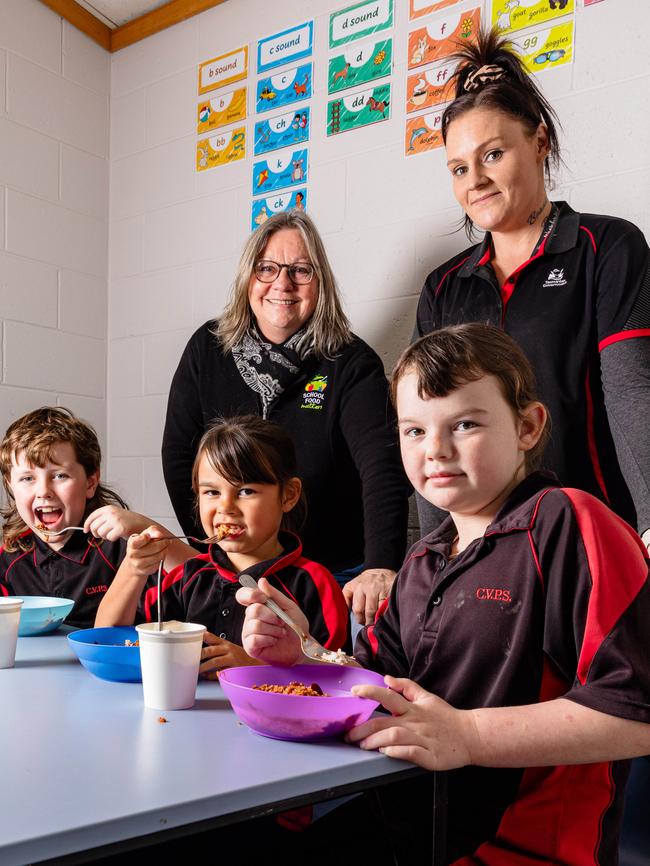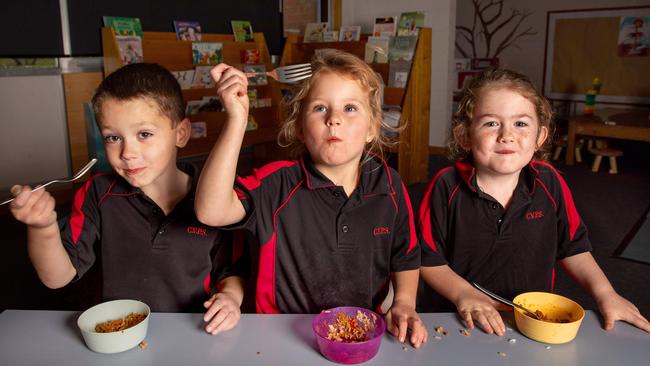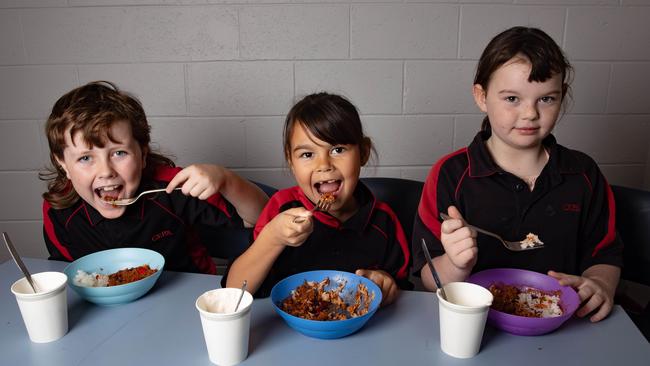School Food Matters delivers lunches to Tasmanian schools
A unique project providing school lunches in some Tasmanian schools – the first of its kind in the country – has been described as “innovative” and leading the way for Australian schools, with other states now taking notice.
Tasmania
Don't miss out on the headlines from Tasmania. Followed categories will be added to My News.
A unique project providing school lunches in some Tasmanian schools – the first of its kind in the country – has been described as “innovative” and leading the way for Australian schools.
Other states are keenly watching the Tasmanian School Lunch Project, funded by the Tasmanian government and a philanthropist, to give nutritious, cooked meals to students from kindergarten to year 10.
Delivered by School Food Matters, the former Tasmanian School Canteen Association, it began in 15 government schools last year after a feasibility study in three schools for 20 days in 2020. It was doubled to 30 government schools this year.
Julie Dunbabin, School Lunch Project manager, said 78,832 meals were served at 15 schools in 2022 through a partnership with Loaves and Fishes Tasmania “who have been instrumental in procuring, cooking and delivering the food to schools”.
“Some schools are cooking from scratch with ingredients supplied by Loaves and Fishes and local growers and producers,” she said.
“Other schools receive the main component of the meal pre-cooked by the Loaves and Fishes commercial kitchen that is delivered through their social enterprise program, working with young people venturing on a career in hospitality.”

Ms Dunbabin was awarded a Churchill Fellowship and in 2019 travelled to the United States, France, Italy, Scotland, England, Finland and Japan to look at how other countries feed children at school.
She found providing school lunches to all children was key to them being well fed so that they could grow, learn and develop social skills to the best of their ability.
“Food in schools matters,” Ms Dunbabin said.
“At least one third of a child’s daily energy intake is consumed at school.
“What these countries’ lunch programs showed was that nutritious food in schools can lead to better focus and concentration, improved classroom behaviour, connectedness, led by Dr Kim Jose, and better learning outcomes.
“We are excited that as the first state in Australia to trial a School Lunch Project, Tasmania is leading the way.”
An interim report recently released by the Menzies Institute for Medical Research, led by Dr Kim Jose, evaluated the project and described it as “innovative and a new way of delivering food in Australian schools”.
“The School Lunch Project was well received by the families and staff of the six schools involved in the 2022 evaluation,” it said. “The ability of the team to implement the project was largely due to the devoted team, their adaptability, and much goodwill to see the project succeed.
“Valuable partnerships were developed, and existing relationships strengthened, with working towards a shared goal a uniting feature.”

In a 2020 evaluation of a feasibility trial, Menzies researcher Dr Kylie Smith had feedback from parents, canteen staff, volunteers, principals, teachers and support staff on the impact of the project.
“Two of the three schools reported that students were calmer and that there was an increase in attendance, particularly among students who were often absent from school,” Dr Smith said.
“It gave all children the chance to have a healthy cooked lunch and to eat as much as they needed.”
The findings of the 2020 study were reinforced by the 2023 Menzies interim report which found school lunches were well received by school communities and had a positive effect on student behaviour.
Two-thirds of children were trying new food and enjoying eating with their friends, 78 per cent of students were eating lunches every day they were provided and some schools indicated an increase in attendance on school lunch days.
The cost per meal in 2022 to produce, package and transport to schools, was $3.09. This did not include any set-up or project management costs.
“Some schools were building curriculum links between the project and initiatives such as leadership and hospitality training,” Ms Dunbabin said.
“Vegetarian meals were provided to students who requested it. Work is under way to be able to provide allergen-free meals to most students.”
A final report by the Menzies Institute for Medical Research on the school lunch project will be available in March 2024.

‘Wonderful initiative’
School principal Carolyn Murray has nothing but praise for the school lunch project and says it’s helped boost school attendance.
Ms Murray is the principal of Clarendon Vale Primary, which has 126 students.
“It’s a wonderful initiative,” she said.
“About 90 per cent of students are participating in the program and even some of those who aren’t necessarily having the whole dish are now willing to have a ‘taster’. The feedback from the students is always positive and there are lots going back for seconds which is always a good sign.”
The school community, she says, is grateful for the lunch program.
For some parents and carers it gives them three days off lunch box duty and many students are “becoming more adventurous to try foods they wouldn’t have tried or been exposed to without this program”.
“Our older students are starting to request expansions to the current menu as they really want to keep trying new foods, I am so proud of their attitude to the program.
“It has certainly helped boost attendance and created calmer playgrounds.
“Sitting down and eating a hot meal together three times a week has helped create a real sense of community throughout the school and really value added to the positive culture of the school, this benefits everyone and we are so grateful to the Tasmanian School Canteen Association for providing us with this opportunity.”
Ms Murray said the school lunch program also tied in well with the school’s kitchen garden program which exposes students to all sorts of vegetables and recipes.
“I feel that both programs are giving our students and their families knowledge and skills around food and nutrition for life,” she said.



